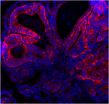Genetics: No evidence of role in racial mortality gap
Despite numerous genomic studies, evidence for a genetic contribution to cardiovascular disease disparities in blacks versus whites provide little insight
2015-03-16
(Press-News.org) There is still no evidence of genetic difference between blacks and whites to account for the health disparities in cardiovascular disease (CVD), according to a new study by McGill University researchers. Published in the American Journal of Epidemiology, the researchers suggest that after a decade of genetic studies, factors such as lifestyle, education and socio-economics - not genetics - are more promising avenues to understanding racial health disparities.
The researchers focused on cardiovascular disease, the largest contributor to the racial mortality gap, and conducted a systematic review for articles published over a seven year period in which genetic data from African and European populations were available. The team found no explanation for racial disease disparities amongst any of the hundreds of genetic variants reported.
"After nearly a decade of genome-wide association studies (GWAS), no assessment had yet been made of their contribution toward an explanation of the most prominent racial health disparities observed at the population level," says Jay Kaufman, of the Department of Epidemiology, Biostatistics & Occupational Health in the Faculty of Medicine.
Kaufman and colleagues assessed the reported associations from published genomic studies, "The fact that our results show so little stable evidence of genetic explanations for racial disparities in CVD could be attributed to a general failure of GWAS to explain observed disease phenotypes," adds Kaufman.
"Despite the enormous social investment in genomic studies, we have not advanced our understanding into disparities in the most common cause of morbidity and mortality between races," says Kaufman, "Given this outcome, more research and investment is needed to examine the effects of social and environmental inequalities, such as exposure to unhealthy food and psychosocial stressors. It is possible that the answer may lie in some kind of interaction between genetic factors and these environmental and behavioural differences, but based on current technology, the detection of such interactions is even more challenging."
INFORMATION:
This study was supported by the Canada Research Chairs Program.
"The Contribution of Genomic Research to Explaining Racial Disparities in Cardiovascular Disease" Jay S. Kaufman, Lena Dolman, Dinela Rishani and Richard S. Cooper, American Journal of Epidemiology DOI:10.1093/aje/kwu319
ELSE PRESS RELEASES FROM THIS DATE:
2015-03-16
Colon cancer is a heavily studied disease -- and for good reason. It is one of the leading causes of cancer-related deaths worldwide, and its numbers are on the rise, from 500,00 deaths in 1990 to 700,000 in 2010.
This growth comes despite scientists' ever-increasing knowledge of the genetic mutations that initiate and drive this disease. Now, a team of researchers from the University of Pennsylvania has found evidence of a new culprit in the disease, a protein called MSI2.
Their findings provide a new target for potential therapeutic intervention in colorectal cancer ...
2015-03-16
A research group in the UA Lunar and Planetary Laboratory has found evidence in meteorites that hint at the discovery of a previously unknown region within the swirling disk of dust and gas known as the protoplanetary disk - which gave rise to the planets in our solar system.
Led by Kelly Miller, a doctoral student in the lab of Dante Lauretta, the principal investigator of NASA's OSIRIS-REx mission, the team has found evidence of minerals within meteorites that formed in an environment that was enhanced in oxygen and sulfur and date from a time before the particles stuck ...
2015-03-16
Researchers from the University of Hawai'i - M?noa (UHM) and colleagues found that microbial communities in different regions of the Pacific Ocean displayed strikingly similar daily rhythms in their metabolism despite inhabiting extremely different habitats - the nutrient-rich waters off California and the nutrient-poor waters north of Hawai'i. Furthermore, in each location, the dominant photoautotrophs - light-loving bacteria that need solar energy to help them photosynthesize food from inorganic substances - appear to initiate a cascade effect wherein the other major ...
2015-03-16
The studies below will be presented at the American College of Cardiology's 64th Annual Scientific Session on Sunday, March 15.
1. Survey Suggests Cardiologists May Not Be Prepared to Counsel Patients on Heart Healthy Diets
Even though most doctors believe diet is important in preventing and managing cardiovascular disease, there are major gaps in their knowledge and, in turn, efforts to educate patients about heart healthy diets may be falling short, according to a recent survey of 236 cardiologists and internal medicine physicians and trainees at a large tertiary ...
2015-03-16
Patients who received the new drug Bendavia before undergoing angioplasty or receiving a stent to clear blocked arteries after a heart attack showed no significant reduction in scarring as compared to patients given a placebo, according to a study presented at the American College of Cardiology's 64th Annual Scientific Session.
The study is the first randomized, controlled trial of Bendavia, a drug designed to reduce the extent of tissue damage in the heart through a new approach that targets mitochondria in the cells. Although patients receiving the drug showed a 10 ...
2015-03-16
SAN DIEGO (March 15, 2015) -- A novel therapy that would allow doctors to turn the body's blood-clotting ability off and on in a more controlled way was about as effective as established anticoagulants in patients undergoing angioplasty but was associated with higher rates of moderate to severe bleeding, according to an analysis of data from a terminated Phase III trial presented at the American College of Cardiology's 64th Annual Scientific Session. The study was officially halted in August due to an excess of severe allergic reactions, so authors caution that the data ...
2015-03-16
SAN DIEGO (March 15, 2015) -- Use of computed tomography coronary angiography, which provides 3-D images of the heart, coupled with standard care allows doctors to more accurately diagnose coronary artery disease in patients presenting with chest pain, therefore, leading to more appropriate follow-up testing and treatments, according to research presented at the American College of Cardiology's 64th Annual Scientific Session. Data also showed a trend toward a lower incidence of heart attacks among the group receiving the tests, known as CT scans, compared to usual care. ...
2015-03-16
SAN DIEGO (March 15, 2015) -- Patients taking evolocumab--an investigational therapy previously shown to dramatically lower "bad" cholesterol--were half as likely to die, suffer a heart attack or stroke, be hospitalized or need a procedure to open blocked arteries compared with those who received standard care, according to research presented at the American College of Cardiology's 64th Annual Scientific Session in San Diego.
In this open-label study, the rate of cardiovascular events was 2.18 percent after one year in the standard of care group, most of whom were on ...
2015-03-16
SAN DIEGO (March 15, 2015) -- The SAPIEN 3 heart valve demonstrated lower death, stroke and paravalvular leak rates than earlier generation devices in patients at high risk for surgery and showed encouraging results in intermediate-risk patients, according to research presented at the American College of Cardiology's 64th Annual Scientific Session.
Transcatheter aortic valve replacement, known as TAVR, is approved for patients with severe aortic stenosis--narrowing of the valve in the heart's main artery--whose health profile makes them ineligible or high-risk candidates ...
2015-03-16
SAN DIEGO (March 15, 2015) -- An investigational device that deflects debris away from the brain during transcatheter aortic valve replacement seems to improve in-hospital safety outcomes and cognitive scores at discharge, according to preliminary findings from a small randomized study presented at the American College of Cardiology's 64th Annual Scientific Session.
The valve replacement procedure, known as TAVR, dislodges minute particles from the clogged valve, freeing them to float through the bloodstream. Much of this debris travels "downstream" from the heart, but ...
LAST 30 PRESS RELEASES:
[Press-News.org] Genetics: No evidence of role in racial mortality gap
Despite numerous genomic studies, evidence for a genetic contribution to cardiovascular disease disparities in blacks versus whites provide little insight


